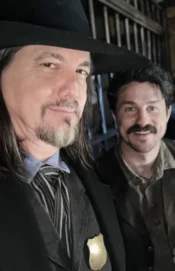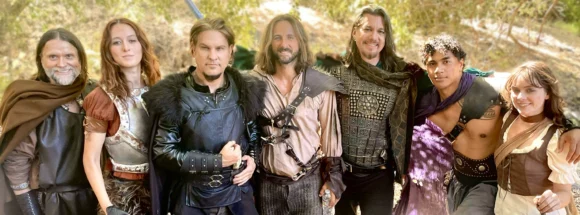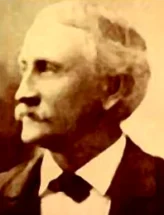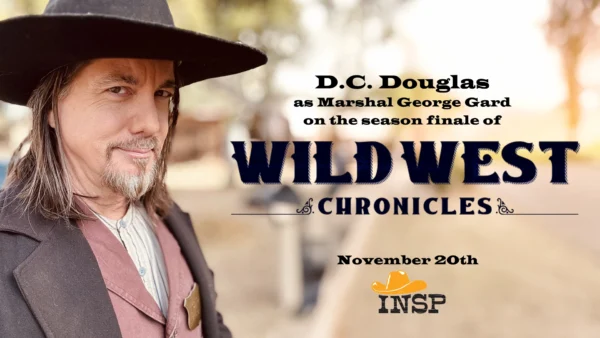Our interview with D.C. Douglas on His Role in Wild West Chronicles and His Quirky Acting Career
If you’re not familiar with D.C. Douglas, you’ve probably heard his voice in one of your favorite video games, seen his face on TV, or caught him in a cult indie film. From playing villains in Resident Evil to guest spots on NCIS, and even working with the outrageous productions of Sharknado 2 and Titanic II, D.C. has carved a niche for himself in both film and television.
Recently, we caught up with him to talk about his upcoming role in the season finale of Wild West Chronicles—where he steps into the boots of Marshal George Gard—and explore his on-camera career. The finale airs November 20th, and it’s clear D.C. is just as excited as we are.
From Video Games to the Wild West
Q: Alright, cowboy, you’ve played everything from evil masterminds to shark bait. What was it like stepping into the world of the Wild West Chronicles? Any moments where you thought, “I’m made for this”?
D.C.: It was a total blast! Funny thing, I never really saw myself as a Western actor because when I moved to L.A. at 19 in the late ’80s, Westerns weren’t exactly popular on TV. But when I booked this role, I got excited because I’m now at an age where I can play the bad guy or the heavy. Although I ended up playing a Marshal—a good guy—I still had room to be intimidating and badass. As with most projects, once you put on the costume, you usually think, “I’m made for this!”
The Power of the Cowboy Hat
Q: Let’s talk about that hat, D.C.. What was it like wearing it and stepping into the boots of a lawman in the Wild West? Did you find it helped shape your performance in ways you didn’t expect?
D.C.: The costume always informs the character. I’m not a huge fan of hats in general because I have a weird head shape—it looks small, but the crown is large. I’ve had some ridiculous moments in hats—like in Titanic II when my captain’s hat looked like a flying saucer. But the cowboy hat? That was surprisingly cool. It fit perfectly and looked great. I felt sexy AF! Plus, Western costumes have layers, which add nuance to movement. It really helps you feel the role in a physical way.
Learning the Art of the Quick Draw (Sort Of)
Q: Did you actually learn to quick draw, or were you more like a toddler fumbling with his first water gun?
 D.C.: Sadly, no. The wild West Chronicles are a 30 minute show with a very limited budget — though talented people and a fun set — so there was no special prep. In fact, the gun was the most difficult part of the gig. They were using handmade blanks for them and because these are period guns they jam very easily. Many of the takes where I have to be shooting only half of what I’m firing is actually making a sound and showing the fire out of the barrel. They told me they fix the rest in post as the old saying goes.
D.C.: Sadly, no. The wild West Chronicles are a 30 minute show with a very limited budget — though talented people and a fun set — so there was no special prep. In fact, the gun was the most difficult part of the gig. They were using handmade blanks for them and because these are period guns they jam very easily. Many of the takes where I have to be shooting only half of what I’m firing is actually making a sound and showing the fire out of the barrel. They told me they fix the rest in post as the old saying goes.
Q: Ah, the magic of post-production! How do you stay in the zone when the prop work doesn’t go as planned? ?
D.C.: It all really depends on the type of production. Because I do so much Voiceover in my day-to-day life, I’m used to picking up right after a flub and continuing on. For on camera, the last time I used a gun that I can recall was for NCIS Los Angeles. In that I had a machine gun of course that is a much larger production budget and we went through practice training earlier in the day and when they did jam during a shot we would stop fix the gun and then continue but on this show time is of the essence and they must get more than the usual amount of pages done in a day so when the gun jams you’re supposed to just fake it till the end of the take. I of course, didn’t know that and ended up stopping mid to and frustrating the first A.D.!
Q: Do you find that the indie or smaller-budget shows bring a different kind of energy or camaraderie?
D.C.: On low budget Indies, it definitely feels like a Band of Brothers trying to make something that will get noticed and will be loved. But on a low budget television show it still has that feel of episodic objectives and you’re just passing through. Though, because it is low budget, the pace of filming is super fast which I absolutely love. Not a lot of downtime to ponder your naval or your career.
Q: Do you find that quick turnaround helps you tap into the character more organically, or does it make you have to rely more on your instincts and experience to nail the performance?
D.C.: That’s an interesting question. I think for most actors the work is done before they get to set so the fact that you move quickly allows you to get out of your head and be more organic with the performance, which is always a good thing!
Throwback to the Early Days
Q: Let’s dig up some dirt from your past. Got any embarrassing stories from your early days with Future Force that’ll make us cringe and laugh simultaneously?
D.C.: Wow, you had to bring up Future Force! Lol! That was my very first film and I had to drive to Riverside to film it for one day and was paid $60! I also had to share my hotel room with the assistant cameraman. I kind of figured it was not the beginning of big things for me, though I was excited that all my scenes would be with David Carradine. Even though we never met on that set — we did meet years later when I edited his then wife’s acting reel. But it most definitely taught me to look out for myself on the set of low budget films. Sadly or hysterically if you look at that film today, you’ll see just how horrible I was in it!
From Cult Classics to Fantasy
Q: Do you purposely choose such eclectic films to do?
D.C.: I love that people think I get to pick and choose roles! Most actors are just auditioning constantly and taking whatever comes their way. Those two films are from The Asylum, and I’ve done about eight or ten projects with them over the past twenty plus years. It feels like I’m part of their repertory company now. I actually have a new one coming out in a few months tentatively called The Witch Hunter—it’s my first fantasy film, so that’ll be fun!

Based on True Events: Fact vs. Fiction
Q: Given that “Wild West Chronicles” is based on true events, how did that influence your approach to playing Marshal George Gard? Did you do any historical research to prepare for the role?
 D.C.: I googled! Lol! So here’s the deal: while this show is based on true events, they make some alterations for dramatic purposes. When you look at a picture of the actual George Gard, you’ll see that we bear no resemblance whatsoever!
D.C.: I googled! Lol! So here’s the deal: while this show is based on true events, they make some alterations for dramatic purposes. When you look at a picture of the actual George Gard, you’ll see that we bear no resemblance whatsoever!
Q: Were there any surprising or lesser-known historical facts you learned while working on this show that you found particularly interesting?
D.C.: The most interesting thing I learned was about the real final battle. In the show, we portray it as a bit more heroic and clean-cut, but the reality was much grittier. There’s an actual photograph taken after the gun battle that reveals just how brutal law enforcement could be in those days.
Q: Well we can’t wait to see you in your first Western role in November! Thanks so much for chatting with us.
D.C.: My career is an under-the-radar quirky one so I’m always tickled when someone cares enough to interview me!
The Final Roundup
Don’t miss the Wild West Chronicles season finale, airing November 20th as D.C. Douglas becomes Marshal George Gard and brings law, order, and maybe a bit of badassery to the Old West – with a side of historical intrigue!









